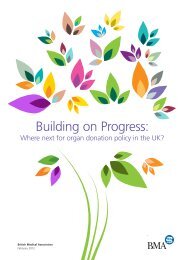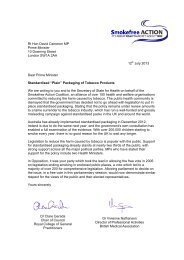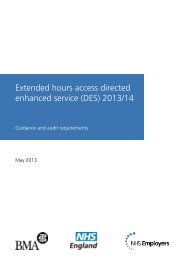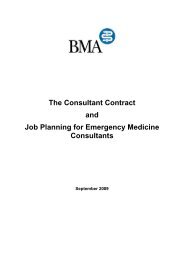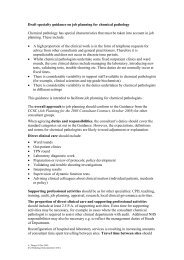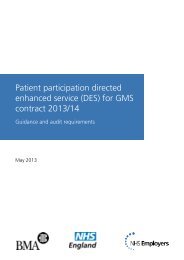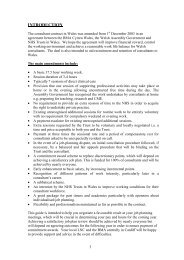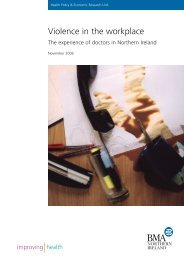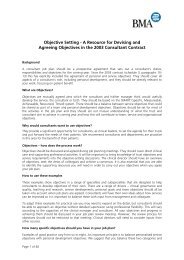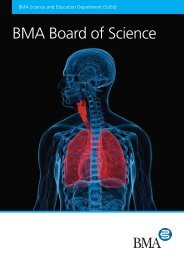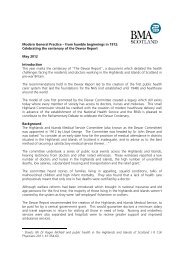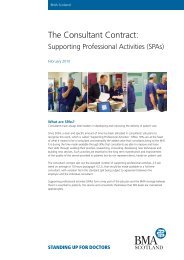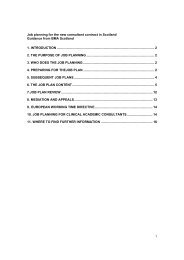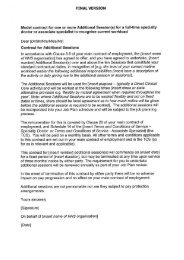Ethics and medical electives in resource-poor countries - a ... - BMA
Ethics and medical electives in resource-poor countries - a ... - BMA
Ethics and medical electives in resource-poor countries - a ... - BMA
You also want an ePaper? Increase the reach of your titles
YUMPU automatically turns print PDFs into web optimized ePapers that Google loves.
<strong>Ethics</strong> <strong>and</strong> <strong>medical</strong> <strong>electives</strong><br />
<strong>in</strong> <strong>resource</strong>-<strong>poor</strong> <strong>countries</strong><br />
A tool kit
<strong>Ethics</strong> <strong>and</strong> <strong>medical</strong> <strong>electives</strong> <strong>in</strong> <strong>resource</strong>-<strong>poor</strong> <strong>countries</strong> – a tool kit<br />
Contents<br />
Contents<br />
CARD 1 ............................................................................................. 5<br />
Stay<strong>in</strong>g with<strong>in</strong> your competence<br />
CARD 2 ............................................................................................. 8<br />
Emergency situations<br />
CARD 3........................................................................................... 12<br />
Ma<strong>in</strong>ta<strong>in</strong><strong>in</strong>g ethical st<strong>and</strong>ards<br />
CARD 4........................................................................................... 16<br />
Cultural differences <strong>and</strong> human rights<br />
CARD 5........................................................................................... 19<br />
M<strong>in</strong>imis<strong>in</strong>g burdens on the host country<br />
CARD 6........................................................................................... 21<br />
Communication<br />
CARD 7........................................................................................... 24<br />
What to do when you have concerns about<br />
fellow students or professional colleagues<br />
CARD 8........................................................................................... 27<br />
Advance plann<strong>in</strong>g <strong>and</strong> preparation<br />
British Medical Association 1
<strong>Ethics</strong> <strong>and</strong> <strong>medical</strong> <strong>electives</strong> <strong>in</strong> <strong>resource</strong>-<strong>poor</strong> <strong>countries</strong> – a tool kit<br />
Introduction<br />
Introduction<br />
The elective can be one of the most reward<strong>in</strong>g parts<br />
of undergraduate <strong>medical</strong> education – it is certa<strong>in</strong>ly<br />
one of the most eagerly anticipated. Properly<br />
planned <strong>and</strong> supported it can be a transform<strong>in</strong>g<br />
educational experience, giv<strong>in</strong>g students a unique<br />
opportunity to learn about some of the most<br />
challeng<strong>in</strong>g contemporary global health issues.<br />
Students may also encounter diseases that are<br />
seldom if ever seen <strong>in</strong> the UK. Work<strong>in</strong>g <strong>in</strong><br />
dem<strong>and</strong><strong>in</strong>g <strong>and</strong> unfamiliar circumstances can<br />
lead to <strong>in</strong>creased <strong>in</strong>dependence <strong>and</strong> self-reliance.<br />
A properly planned elective can also provide a<br />
fasc<strong>in</strong>at<strong>in</strong>g <strong>in</strong>sight <strong>in</strong>to other cultures <strong>and</strong> health<br />
systems. In an <strong>in</strong>creas<strong>in</strong>gly multicultural <strong>and</strong><br />
globalised world, these experiences can be<br />
enormously enrich<strong>in</strong>g, both personally <strong>and</strong><br />
professionally.<br />
Although the overwhelm<strong>in</strong>g majority of students<br />
enjoy <strong>electives</strong> <strong>in</strong> develop<strong>in</strong>g <strong>countries</strong> they can also<br />
be challeng<strong>in</strong>g. Resource-<strong>poor</strong> sett<strong>in</strong>gs can present<br />
<strong>medical</strong> students with search<strong>in</strong>g ethical <strong>and</strong> cl<strong>in</strong>ical<br />
dilemmas. They can f<strong>in</strong>d themselves asked to<br />
undertake procedures that they may feel are<br />
beyond their competence. There may be problems<br />
underst<strong>and</strong><strong>in</strong>g local languages or dialects. Different<br />
cultures can have different approaches to<br />
fundamental issues such as consent – <strong>in</strong> some<br />
cultures, for example, tribal leaders, heads of<br />
families, or husb<strong>and</strong>s will be expected to be<br />
<strong>in</strong>volved <strong>in</strong> decisions that, <strong>in</strong> the UK, we would<br />
expect to be taken by the patient. In some cultures,<br />
gender still plays a significant role, <strong>and</strong> patients may<br />
expect to be seen by a doctor of the same sex.<br />
Gender-based violence may also be viewed<br />
2 British Medical Association
<strong>Ethics</strong> <strong>and</strong> <strong>medical</strong> <strong>electives</strong> <strong>in</strong> <strong>resource</strong>-<strong>poor</strong> <strong>countries</strong> – a tool kit<br />
Introduction<br />
differently: <strong>in</strong> some <strong>countries</strong> it is far more widely<br />
tolerated than <strong>in</strong> the UK. Underst<strong>and</strong><strong>in</strong>g <strong>and</strong><br />
respond<strong>in</strong>g to these issues sensitively can make<br />
a big difference to the success of an elective.<br />
Health systems <strong>in</strong> develop<strong>in</strong>g <strong>countries</strong> are also<br />
under extreme pressure. Affluent <strong>countries</strong> struggle<br />
to meet the needs of their populations with<br />
<strong>resource</strong>s that are almost unimag<strong>in</strong>able <strong>in</strong> <strong>poor</strong>er<br />
<strong>countries</strong>. Support<strong>in</strong>g elective placements provides<br />
an additional adm<strong>in</strong>istrative burden on health<br />
systems that are already stretched. It can also place<br />
additional stresses on health professionals who may<br />
be required to supervise, or to provide teach<strong>in</strong>g<br />
support, to visit<strong>in</strong>g students. It is vital therefore<br />
that students consider how they can m<strong>in</strong>imise<br />
the dem<strong>and</strong>s they make on health systems, while<br />
ensur<strong>in</strong>g appropriate support <strong>and</strong> supervision.<br />
In many <strong>resource</strong>-<strong>poor</strong> sett<strong>in</strong>gs patients will<br />
comb<strong>in</strong>e conventional medic<strong>in</strong>e with care or heal<strong>in</strong>g<br />
that we may regard as alternative. Local healers,<br />
‘barefoot doctors’, traditional midwives can all be<br />
a feature of health services <strong>in</strong> develop<strong>in</strong>g <strong>countries</strong>.<br />
Students can learn a great deal from these health<br />
workers <strong>and</strong> their views should not be dismissed.<br />
Medic<strong>in</strong>es that would require a prescription <strong>in</strong> the<br />
UK can also be sold <strong>in</strong> <strong>in</strong>formal sett<strong>in</strong>gs without<br />
<strong>medical</strong> <strong>in</strong>volvement while many medic<strong>in</strong>es that<br />
are used rout<strong>in</strong>ely <strong>in</strong> the UK can be unavailable.<br />
Learn<strong>in</strong>g to work with a mixture of traditional<br />
<strong>and</strong> western approaches to medic<strong>in</strong>e can be a<br />
fasc<strong>in</strong>at<strong>in</strong>g experience. In many <strong>countries</strong>, patients<br />
have to pay for some or all of their treatment, <strong>and</strong><br />
students can f<strong>in</strong>d it a distress<strong>in</strong>g experience to<br />
British Medical Association 3
<strong>Ethics</strong> <strong>and</strong> <strong>medical</strong> <strong>electives</strong> <strong>in</strong> <strong>resource</strong>-<strong>poor</strong> <strong>countries</strong> – a tool kit<br />
Introduction<br />
restrict treatments to people because they cannot<br />
afford them. Many local health professionals have<br />
found creative ways around some of these<br />
problems, <strong>and</strong> their <strong>resource</strong>fulness can be both<br />
educational <strong>and</strong> <strong>in</strong>spir<strong>in</strong>g.<br />
This short tool kit sets out some of the key ethical<br />
factors to take <strong>in</strong>to account when plann<strong>in</strong>g for a<br />
successful elective. Draw<strong>in</strong>g on a range of student<br />
experiences, it looks at issues such as: recognis<strong>in</strong>g<br />
<strong>and</strong> work<strong>in</strong>g with<strong>in</strong> limits; underst<strong>and</strong><strong>in</strong>g <strong>and</strong><br />
respond<strong>in</strong>g to cultural differences; preparation <strong>and</strong><br />
plann<strong>in</strong>g, <strong>and</strong> what to do when you have concerns<br />
about fellow students or professional colleagues.<br />
Supported by case studies <strong>and</strong> commentary from<br />
<strong>medical</strong> students, this tool kit provides practical<br />
advice on manag<strong>in</strong>g the k<strong>in</strong>ds of common ethical<br />
dilemmas <strong>and</strong> conflicts that students can experience<br />
on their <strong>electives</strong>. Given appropriate plann<strong>in</strong>g <strong>and</strong><br />
forethought your elective can be a source of<br />
important personal <strong>and</strong> professional growth.<br />
You could also make a positive contribution to<br />
the health system <strong>in</strong> which you work.<br />
4 British Medical Association
CARD 1<br />
Stay<strong>in</strong>g with<strong>in</strong> your competence<br />
In develop<strong>in</strong>g <strong>countries</strong>, shortages of qualified<br />
health care staff comb<strong>in</strong>ed with extremes of health<br />
need can mean that students may f<strong>in</strong>d themselves<br />
<strong>in</strong> a position where they are <strong>in</strong>vited to undertake a<br />
range of procedures that they would not be <strong>in</strong> a<br />
position to do at home. Appropriately supervised,<br />
<strong>and</strong> provided patients agree to be seen by <strong>medical</strong><br />
students, this may not be a problem. H<strong>and</strong>led<br />
properly, these experiences can be a significant<br />
learn<strong>in</strong>g opportunity.<br />
Students work<strong>in</strong>g <strong>in</strong> <strong>resource</strong>-<strong>poor</strong> sett<strong>in</strong>gs have<br />
at times felt under pressure from local health<br />
professionals to take on more responsibility than<br />
they are qualified to accept. Given the scale of the<br />
health problems that they may be encounter<strong>in</strong>g <strong>and</strong><br />
the encouragement from senior staff, it can be very<br />
difficult for students to decl<strong>in</strong>e. The fact that they<br />
are overseas <strong>and</strong> work<strong>in</strong>g <strong>in</strong> an unfamiliar<br />
environment can lead to moral disorientation.<br />
Cultural relativism – the idea that ethical codes are<br />
different <strong>in</strong> different <strong>countries</strong> – can seem attractive<br />
abroad, <strong>and</strong> can lead to students go<strong>in</strong>g along with<br />
practices that they would decl<strong>in</strong>e, or would not be<br />
considered qualified to undertake, at home. Given<br />
the lack of <strong>resource</strong>s it can also be tempt<strong>in</strong>g to<br />
th<strong>in</strong>k that any <strong>in</strong>tervention, however unqualified,<br />
is better than noth<strong>in</strong>g.<br />
Students on <strong>electives</strong> must remember that they are<br />
under an obligation to ma<strong>in</strong>ta<strong>in</strong> the st<strong>and</strong>ards set<br />
by the General Medical Council (GMC). In Good<br />
British Medical Association 5
<strong>Ethics</strong> <strong>and</strong> <strong>medical</strong> <strong>electives</strong> <strong>in</strong> <strong>resource</strong>-<strong>poor</strong> <strong>countries</strong> – a tool kit<br />
Stay<strong>in</strong>g with<strong>in</strong> your competence<br />
Medical Practice, the GMC states that ‘you must<br />
work with<strong>in</strong> the limits of your competence.’ If asked<br />
to undertake procedures that you would not be<br />
asked to undertake at home, it is important to ask<br />
the follow<strong>in</strong>g questions:<br />
Why are you not allowed to do this procedure<br />
at home?<br />
Are you capable of perform<strong>in</strong>g it without suitable<br />
supervision?<br />
Are you putt<strong>in</strong>g your patient or yourself at risk?<br />
Would it be possible or practicable to ask for<br />
supervision without impos<strong>in</strong>g excessive burdens<br />
on other key health personnel?<br />
Although it may not always be possible to come<br />
up with a def<strong>in</strong>itive answer to these questions,<br />
they can be a useful guide. Where students believe<br />
they are be<strong>in</strong>g asked to act beyond their cl<strong>in</strong>ical<br />
competence they should politely but firmly decl<strong>in</strong>e.<br />
It is worth bear<strong>in</strong>g <strong>in</strong> m<strong>in</strong>d that the GMC’s<br />
guidel<strong>in</strong>es can protect both patients <strong>and</strong> <strong>medical</strong><br />
students. Some students have reported return<strong>in</strong>g<br />
from their <strong>electives</strong> feel<strong>in</strong>g traumatised. Hav<strong>in</strong>g<br />
acted beyond their competence, they were left<br />
with nagg<strong>in</strong>g doubts about whether they had done<br />
more harm than good <strong>and</strong> a potentially reward<strong>in</strong>g<br />
educational experience had turned <strong>in</strong>to an occasion<br />
for regret <strong>and</strong> self-doubt.<br />
More worry<strong>in</strong>gly, there have been reports <strong>in</strong> the<br />
media that some <strong>medical</strong> students have deliberately<br />
exploited the possibilities of an elective <strong>in</strong> a<br />
develop<strong>in</strong>g country to practice their own skills<br />
irrespective of the views or needs of the patient.<br />
6 British Medical Association
<strong>Ethics</strong> <strong>and</strong> <strong>medical</strong> <strong>electives</strong> <strong>in</strong> <strong>resource</strong>-<strong>poor</strong> <strong>countries</strong> – a tool kit<br />
Stay<strong>in</strong>g with<strong>in</strong> your competence<br />
<strong>Ethics</strong> <strong>and</strong> <strong>medical</strong> <strong>electives</strong> <strong>in</strong> <strong>resource</strong>-<strong>poor</strong> <strong>countries</strong> – a tool kit<br />
Such activities are unethical <strong>and</strong> are likely to be<br />
illegal <strong>and</strong> can leave students open to fitness to<br />
practice procedures at their <strong>medical</strong> school or legal<br />
action <strong>in</strong> the host country. This issue is covered <strong>in</strong><br />
more detail <strong>in</strong> Card 7.<br />
Key messages<br />
Medical students on <strong>electives</strong> should not<br />
act outside their competence without<br />
appropriate supervision.<br />
Where you have significant doubts, you<br />
should seek <strong>in</strong>formed advice as a matter<br />
of urgency. This could be via your<br />
<strong>medical</strong> school, the <strong>BMA</strong> <strong>Ethics</strong><br />
Department or the GMC.<br />
British Medical Association 7
CARD 2<br />
Emergency situations<br />
Dur<strong>in</strong>g <strong>electives</strong> students may be confronted with<br />
<strong>medical</strong> emergencies. This is perhaps more likely <strong>in</strong><br />
<strong>resource</strong>-<strong>poor</strong> sett<strong>in</strong>gs than <strong>in</strong> developed <strong>countries</strong><br />
as qualified <strong>medical</strong> staff <strong>and</strong> other health care<br />
<strong>resource</strong>s can be <strong>in</strong> extremely short supply.<br />
Respond<strong>in</strong>g to emergencies can present students –<br />
<strong>and</strong> qualified health staff – with challeng<strong>in</strong>g ethical<br />
dilemmas, <strong>and</strong> consideration should be given <strong>in</strong><br />
advance of the elective to how students should<br />
deal with them. Ideally, students should have an<br />
opportunity to discuss such eventualities before they<br />
go abroad. Prior discussion with senior staff, <strong>and</strong><br />
with students who have returned from <strong>electives</strong>,<br />
can contribute enormously to preparedness. Medical<br />
schools should be encouraged to provide preelective<br />
guidance <strong>and</strong> tra<strong>in</strong><strong>in</strong>g.<br />
The advice given <strong>in</strong> card one about work<strong>in</strong>g with<strong>in</strong><br />
competencies is relevant to this section. In an<br />
emergency however, <strong>and</strong> <strong>in</strong> the absence of<br />
appropriately qualified staff, students might be<br />
called upon, or feel that they ought to <strong>in</strong>tervene,<br />
even where they would not normally be considered<br />
competent to do so. In these circumstances<br />
students need to act carefully. Students should<br />
not <strong>in</strong>tervene where they are more likely to<br />
make matters worse. Where there is a reasonable<br />
likelihood however that an <strong>in</strong>tervention <strong>in</strong> an<br />
emergency can prevent or mitigate serious harm<br />
to a patient, then it can be appropriate to assist.<br />
8 British Medical Association
<strong>Ethics</strong> <strong>and</strong> <strong>medical</strong> <strong>electives</strong> <strong>in</strong> <strong>resource</strong>-<strong>poor</strong> <strong>countries</strong> – a tool kit<br />
Emergency situations<br />
In <strong>resource</strong>-<strong>poor</strong> sett<strong>in</strong>gs situations may rout<strong>in</strong>ely<br />
occur that would be regarded as emergencies <strong>in</strong><br />
more developed <strong>countries</strong>. It is important to<br />
emphasise that students must avoid gett<strong>in</strong>g<br />
<strong>in</strong>volved <strong>in</strong> provid<strong>in</strong>g rout<strong>in</strong>e care that is<br />
outside their level of competence. Where a<br />
patient is at immediate risk of death or serious<br />
harm, <strong>and</strong> no other qualified health professional is<br />
available, students can assist, provided they have a<br />
reasonable belief that they can improve outcomes.<br />
Healthcare <strong>in</strong> the United K<strong>in</strong>gdom often has<br />
established hierarchies of experience <strong>and</strong><br />
responsibility. In <strong>resource</strong>-<strong>poor</strong> sett<strong>in</strong>gs such<br />
hierarchical preconceptions can be unhelpful. A<br />
nurse or an unqualified rural midwife may have had<br />
considerable prior experience of the situation. In the<br />
absence of a <strong>medical</strong> colleague some of the local<br />
healers may have paramedic skills. Care is obviously<br />
required <strong>in</strong> relation to delegation to unqualified<br />
practitioners.<br />
Although emergencies can be a vital source of<br />
experience for <strong>medical</strong> students, they can also be<br />
extremely distress<strong>in</strong>g <strong>and</strong> some students have<br />
reported feel<strong>in</strong>g traumatised <strong>and</strong> out of control.<br />
When consider<strong>in</strong>g an elective, it is important to give<br />
prior thought to those placements <strong>and</strong> specialties,<br />
such as obstetrics <strong>and</strong> gynaecology <strong>and</strong> some<br />
surgical attachments, where emergencies are more<br />
likely to occur. Aga<strong>in</strong>, students undertak<strong>in</strong>g such<br />
<strong>electives</strong> should talk with senior colleagues about<br />
the k<strong>in</strong>ds of emergencies they may be exposed to,<br />
<strong>and</strong> how best they may be dealt with.<br />
British Medical Association 9
<strong>Ethics</strong> <strong>and</strong> <strong>medical</strong> <strong>electives</strong> <strong>in</strong> <strong>resource</strong>-<strong>poor</strong> <strong>countries</strong> – a tool kit<br />
Emergency situations<br />
Key message<br />
Where a patient is at immediate risk<br />
of death or serious harm, <strong>and</strong> no other<br />
qualified health professional is available,<br />
students can assist, provided they have<br />
a reasonable belief that they have<br />
appropriate skills <strong>and</strong> can improve<br />
outcomes.<br />
Scenario<br />
You are called to see a pregnant woman <strong>in</strong><br />
obstructed labour who requires a caesarean<br />
section. You lack the qualifications to perform<br />
such an <strong>in</strong>tervention but you have assisted with<br />
several as part of your six weeks obstetrics <strong>and</strong><br />
gynaecology placement. Should you attempt to<br />
perform a caesarean section?<br />
Many students will not encounter emergencies<br />
on their <strong>electives</strong>, particularly <strong>in</strong> an unsupervised<br />
sett<strong>in</strong>g. Hav<strong>in</strong>g said this, should an unsupervised<br />
emergency arise, it can be one of the biggest<br />
challenges that you could face on an elective.<br />
Certa<strong>in</strong> specialties, such as obstetrics, are<br />
associated with emergencies that can be<br />
particularly distress<strong>in</strong>g. If you are likely to<br />
encounter obstetric emergencies, you should<br />
consider seek<strong>in</strong>g advice from colleagues <strong>in</strong> this<br />
specialty before you go.<br />
When confronted with an emergency, key th<strong>in</strong>gs<br />
to consider <strong>in</strong>clude whether anyone is available<br />
with more experience, even if not a doctor. For<br />
example, a rural midwife or paramedic who may<br />
not be able to carry out the procedure <strong>in</strong><br />
question, but could at least contribute their<br />
10 British Medical Association
<strong>Ethics</strong> <strong>and</strong> <strong>medical</strong> <strong>electives</strong> <strong>in</strong> <strong>resource</strong>-<strong>poor</strong> <strong>countries</strong> – a tool kit<br />
Emergency situations<br />
experience about any possible alternative<br />
management. It is also important to realistically<br />
assess what you can competently perform <strong>and</strong><br />
what would be the implications of your actions.<br />
Rather than just th<strong>in</strong>k of the situation <strong>in</strong> front of<br />
you, consider all the possible outcomes – what<br />
are the likely results of your actions? If there is<br />
the potential that they would result <strong>in</strong><br />
complications or additional harm, would further<br />
care for the patient be available? Basic but<br />
prompt measures taken on the spot can be<br />
life sav<strong>in</strong>g but complex procedures such as a<br />
caesarean section should be the remit of tra<strong>in</strong>ed<br />
health professionals with experience of how<br />
to h<strong>and</strong>le potential complications.<br />
It might seem difficult to consider all these<br />
options <strong>in</strong> a short space of time, so make sure<br />
you underst<strong>and</strong> the health system as much as<br />
you can beforeh<strong>and</strong>, <strong>and</strong> familiarise yourself with<br />
what other health facilities are available to care<br />
for the patient after the emergency, <strong>in</strong> order<br />
to prepare yourself for respond<strong>in</strong>g to possible<br />
emergencies <strong>and</strong> how to direct them to<br />
appropriate care, rather than feel<strong>in</strong>g it is your<br />
responsibility to respond. Overall, before<br />
<strong>in</strong>terven<strong>in</strong>g <strong>in</strong> an emergency, you need to have a<br />
reasonable belief that you can improve outcomes,<br />
tak<strong>in</strong>g <strong>in</strong>to consideration the preced<strong>in</strong>g issues.<br />
Know<strong>in</strong>g when not to act, <strong>and</strong> know<strong>in</strong>g how to<br />
communicate this to those who want you to act,<br />
<strong>in</strong> a clear <strong>and</strong> firm manner is a key communication<br />
skill that it is important for <strong>medical</strong> students to<br />
learn. Say<strong>in</strong>g no is not about lett<strong>in</strong>g people<br />
down, it is about mak<strong>in</strong>g important decisions<br />
<strong>and</strong> communicat<strong>in</strong>g them.<br />
British Medical Association 11
CARD 3<br />
Ma<strong>in</strong>ta<strong>in</strong><strong>in</strong>g ethical st<strong>and</strong>ards<br />
Medical students must ma<strong>in</strong>ta<strong>in</strong> the same high<br />
st<strong>and</strong>ards of professional ethics dur<strong>in</strong>g their elective<br />
as they would dur<strong>in</strong>g cl<strong>in</strong>ical rotations at home.<br />
Although the circumstances may be radically<br />
different <strong>in</strong> <strong>resource</strong>-<strong>poor</strong> sett<strong>in</strong>gs, duties to patients<br />
rema<strong>in</strong> the same. Cards one <strong>and</strong> two have looked<br />
at ethical obligations to work with<strong>in</strong> professional<br />
competencies <strong>and</strong> how to respond to emergencies.<br />
This card gives a number of general ethical po<strong>in</strong>ters<br />
for students.<br />
Honesty <strong>and</strong> <strong>in</strong>tegrity<br />
Medical students must act with honesty <strong>and</strong><br />
<strong>in</strong>tegrity at all times. Medical students are not<br />
doctors <strong>and</strong> must not mislead patients <strong>in</strong>to false<br />
beliefs about their qualifications or abilities. Patients<br />
have a right to be <strong>in</strong>formed that they are be<strong>in</strong>g<br />
attended by a student, <strong>and</strong> should be able to<br />
decl<strong>in</strong>e without their care be<strong>in</strong>g prejudiced.<br />
Treat all patients with dignity <strong>and</strong> respect<br />
There are many ways that the obligation to<br />
treat patients with dignity <strong>and</strong> respect can be<br />
underm<strong>in</strong>ed. This can be particularly true of health<br />
services <strong>in</strong> <strong>resource</strong>-<strong>poor</strong> sett<strong>in</strong>gs. Power imbalances<br />
between doctors <strong>and</strong> patients can be marked.<br />
Poor health comb<strong>in</strong>ed with m<strong>in</strong>imal f<strong>in</strong>ancial<br />
<strong>resource</strong>s can lead to heightened vulnerabilty<br />
among patients. This should not be allowed to<br />
obscure the fundamental ethical obligation to<br />
treat all patients with equal dignity.<br />
12 British Medical Association
<strong>Ethics</strong> <strong>and</strong> <strong>medical</strong> <strong>electives</strong> <strong>in</strong> <strong>resource</strong>-<strong>poor</strong> <strong>countries</strong> – a tool kit<br />
Ma<strong>in</strong>ta<strong>in</strong><strong>in</strong>g ethical st<strong>and</strong>ards<br />
Non-discrim<strong>in</strong>ation<br />
In some cultures there can be both explicit <strong>and</strong><br />
implicit discrim<strong>in</strong>ation aga<strong>in</strong>st certa<strong>in</strong> groups.<br />
Some <strong>in</strong>digenous peoples, migrants, the <strong>in</strong>ternally<br />
displaced, the rural, or people from different ethnic<br />
groups or castes can all be discrim<strong>in</strong>ated aga<strong>in</strong>st.<br />
Individuals suffer<strong>in</strong>g from certa<strong>in</strong> illnesses, such as<br />
HIV/AIDS can also be the focus of discrim<strong>in</strong>ation.<br />
Students should not participate <strong>in</strong> any form of<br />
exclusion or discrim<strong>in</strong>ation.<br />
The patient’s needs are paramount<br />
Although the purpose of a <strong>medical</strong> elective is<br />
educational, students must remember that the<br />
needs of patients must come first. Students should<br />
never put their own educational <strong>in</strong>terests before<br />
the health needs of patients.<br />
Consent <strong>and</strong> confidentiality<br />
Although this is an area of ethical <strong>and</strong> cl<strong>in</strong>ical<br />
practice subject to some cultural variation, all<br />
patients have a right to be appropriately <strong>in</strong>formed<br />
of the nature <strong>and</strong> purpose of any <strong>in</strong>tervention <strong>and</strong><br />
any relevant alternatives. Informed consent must be<br />
sought before any <strong>in</strong>tervention, <strong>and</strong> confidential<br />
health <strong>in</strong>formation must be respected just as it<br />
would be <strong>in</strong> the UK. Particular thought must be<br />
given to how <strong>in</strong>formed consent can be obta<strong>in</strong>ed<br />
where the student does not speak the local<br />
language.<br />
Cultural openness<br />
An elective can offer a unique opportunity to ga<strong>in</strong><br />
experience of health care provision <strong>in</strong> a very<br />
different part of the world. A key aspect of this is<br />
see<strong>in</strong>g how other cultures approach not just health<br />
care, but also health <strong>and</strong> illness itself. The impact of<br />
British Medical Association 13
<strong>Ethics</strong> <strong>and</strong> <strong>medical</strong> <strong>electives</strong> <strong>in</strong> <strong>resource</strong>-<strong>poor</strong> <strong>countries</strong> – a tool kit<br />
Ma<strong>in</strong>ta<strong>in</strong><strong>in</strong>g ethical st<strong>and</strong>ards<br />
visit<strong>in</strong>g a develop<strong>in</strong>g country for the first time, <strong>and</strong><br />
early experiences of provid<strong>in</strong>g treatment <strong>in</strong> <strong>resource</strong><strong>poor</strong><br />
sett<strong>in</strong>gs, can be overwhelm<strong>in</strong>g <strong>and</strong> can lead to<br />
critical first impressions. Although these responses<br />
are underst<strong>and</strong>able, students should try <strong>and</strong> set<br />
them to one side. The overwhelm<strong>in</strong>g majority of<br />
students regard <strong>medical</strong> <strong>electives</strong> <strong>in</strong> develop<strong>in</strong>g<br />
<strong>countries</strong> as a positive educational experience with<br />
unsettl<strong>in</strong>g first impressions giv<strong>in</strong>g way both to<br />
greater underst<strong>and</strong><strong>in</strong>g <strong>and</strong> respect. Cultural<br />
openness is a prerequisite both for good patient<br />
care <strong>and</strong> a successful elective.<br />
Key message<br />
Medical students must ma<strong>in</strong>ta<strong>in</strong> the<br />
same high st<strong>and</strong>ards of professional<br />
ethics dur<strong>in</strong>g their elective as they<br />
would at home.<br />
Scenario<br />
When work<strong>in</strong>g <strong>in</strong> a cl<strong>in</strong>ic, there can be pressure<br />
to prescribe or dispense drugs which are<br />
unsuitable as treatments for the patient’s<br />
condition. This has occurred when non-<strong>medical</strong>ly<br />
qualified professionals have been runn<strong>in</strong>g rural<br />
outreach cl<strong>in</strong>ics. This may be due to the condition<br />
be<strong>in</strong>g untreatable or drugs be<strong>in</strong>g unavailable,<br />
but patients expect<strong>in</strong>g someth<strong>in</strong>g from the health<br />
care team, hav<strong>in</strong>g travelled a distance, given up<br />
valuable time <strong>and</strong> spent their limited funds on<br />
an appo<strong>in</strong>tment.<br />
14 British Medical Association
<strong>Ethics</strong> <strong>and</strong> <strong>medical</strong> <strong>electives</strong> <strong>in</strong> <strong>resource</strong>-<strong>poor</strong> <strong>countries</strong> – a tool kit<br />
Ma<strong>in</strong>ta<strong>in</strong><strong>in</strong>g ethical st<strong>and</strong>ards<br />
In some respects, this scenario has its equivalent<br />
<strong>in</strong> the developed world, with many GPs report<strong>in</strong>g<br />
that patients will ord<strong>in</strong>arily expect a prescription<br />
follow<strong>in</strong>g a visit to the doctor <strong>in</strong> the UK. It is<br />
clearly unethical to provide <strong>in</strong>appropriate<br />
treatment to a patient, irrespective of his or her<br />
expectations, but it is important to consult with a<br />
senior local <strong>medical</strong> colleague, wherever possible,<br />
before mak<strong>in</strong>g a decision about a particular<br />
treatment. If the treatment is <strong>in</strong>appropriate, such<br />
a request should be politely but firmly rejected.<br />
You will need to be able to provide arguments<br />
for why you’re unable to treat the patients with<br />
unsuitable medication, such as discuss<strong>in</strong>g the<br />
risks of treat<strong>in</strong>g patients with unnecessary drugs.<br />
It is important to discuss your reasons with the<br />
team you’re work<strong>in</strong>g with rather than just refuse<br />
<strong>and</strong> together ensure that your actions are fully<br />
expla<strong>in</strong>ed to patients. Aga<strong>in</strong>, you can fall back<br />
on the guidance from Good Medical Practice <strong>and</strong><br />
the fact that you have to comply with the GMC<br />
guidel<strong>in</strong>es at all times. Many <strong>countries</strong> face<br />
shortages of drugs <strong>and</strong> only provid<strong>in</strong>g a limited,<br />
<strong>in</strong>sufficient, course to patients can prolong their<br />
health problems as well as lead<strong>in</strong>g to drug<br />
resistance. Patients are also often required to<br />
pay for their own drugs so be aware of the<br />
implication of any recommendations for drugs<br />
which even if available, may place a considerable<br />
f<strong>in</strong>ancial burden on patients.<br />
British Medical Association 15
CARD 4<br />
Cultural differences <strong>and</strong> human rights<br />
Although students are bound by the same ethical<br />
pr<strong>in</strong>ciples, such as show<strong>in</strong>g respect for persons,<br />
whether they are work<strong>in</strong>g at home or abroad,<br />
different cultures can express such fundamental<br />
pr<strong>in</strong>ciples differently. Although students may <strong>in</strong>itially<br />
f<strong>in</strong>d this disorientat<strong>in</strong>g, it is a key challenge <strong>in</strong><br />
medic<strong>in</strong>e, <strong>and</strong> it can be as important <strong>in</strong> a culturally<br />
diverse NHS as <strong>in</strong> a develop<strong>in</strong>g country. An<br />
underst<strong>and</strong><strong>in</strong>g of the ways different values can be<br />
expressed by patients, <strong>and</strong> the impact this can have<br />
on health care, is a key part of a <strong>medical</strong> education.<br />
Students should be encouraged to research both<br />
the culture <strong>and</strong> the health system <strong>in</strong> which they will<br />
be work<strong>in</strong>g prior to departure.<br />
One of the areas <strong>in</strong> which differences of approach<br />
are frequently encountered is <strong>in</strong> relation to what is<br />
sometimes called ‘autonomy’. In the UK there is a<br />
strong expectation that competent <strong>in</strong>dividuals will<br />
make their own health care choices, supported by<br />
<strong>in</strong>formation <strong>and</strong> advice from health professionals.<br />
Other <strong>countries</strong> with different political traditions <strong>and</strong><br />
histories may not put such a strong emphasis on<br />
<strong>in</strong>dividual choice. In some cultures, for example, it<br />
will be expected that families will participate more<br />
<strong>in</strong> decision mak<strong>in</strong>g.<br />
In some cultures, gender roles <strong>and</strong> expectations can<br />
also be very different. Some parts of the world<br />
reta<strong>in</strong> a more patriarchal outlook, <strong>and</strong> there may be<br />
an expectation that men, for example, will make<br />
16 British Medical Association
<strong>Ethics</strong> <strong>and</strong> <strong>medical</strong> <strong>electives</strong> <strong>in</strong> <strong>resource</strong>-<strong>poor</strong> <strong>countries</strong> – a tool kit<br />
Cultural differences <strong>and</strong> human rights<br />
decisions about treatment for women, <strong>in</strong>clud<strong>in</strong>g<br />
decisions about women’s reproductive health.<br />
Such expectations can be challeng<strong>in</strong>g for students<br />
educated <strong>in</strong> cultures that are predicated on gender<br />
equality <strong>and</strong> a respect for <strong>in</strong>dividual choices.<br />
Students have expressed disorientation when<br />
presented with such differences of approach,<br />
<strong>and</strong> can be uncerta<strong>in</strong> whether they are behav<strong>in</strong>g<br />
appropriately. Students need to approach cultural<br />
differences with openness <strong>and</strong> sensitivity <strong>and</strong> a<br />
will<strong>in</strong>gness to learn from those they are meet<strong>in</strong>g,<br />
both cl<strong>in</strong>icians <strong>and</strong> patients. Such an approach<br />
should not however be uncritical. Bad practices<br />
can develop anywhere, <strong>and</strong> students need to keep<br />
<strong>in</strong> m<strong>in</strong>d that the <strong>in</strong>terests of the patient are at<br />
the centre of medic<strong>in</strong>e. By focus<strong>in</strong>g on patients,<br />
<strong>and</strong> listen<strong>in</strong>g to the patient’s views, wishes <strong>and</strong><br />
expectations, it will normally be possible to work<br />
through apparently conflict<strong>in</strong>g cultural approaches<br />
to identify how best to promote patient <strong>in</strong>terests.<br />
Approach<strong>in</strong>g an elective with openness, <strong>and</strong> a<br />
will<strong>in</strong>gness to discuss doubts <strong>and</strong> conflicts with<br />
fellow <strong>medical</strong> staff can make a significant<br />
difference to an elective.<br />
Some students have reported be<strong>in</strong>g asked to<br />
participate <strong>in</strong> activities that they have regarded as<br />
unethical but that overseas colleagues have not<br />
found problematic. Where students are <strong>in</strong>vited to<br />
participate <strong>in</strong> practices that they believe to be clearly<br />
harmful, they should politely but firmly decl<strong>in</strong>e.<br />
Cultural differences should not be used as an<br />
excuse to mask <strong>poor</strong> practice or to permit avoidable<br />
harm. Where possible, students should try to discuss<br />
the issue with appropriate senior staff.<br />
British Medical Association 17
<strong>Ethics</strong> <strong>and</strong> <strong>medical</strong> <strong>electives</strong> <strong>in</strong> <strong>resource</strong>-<strong>poor</strong> <strong>countries</strong> – a tool kit<br />
Cultural differences <strong>and</strong> human rights<br />
Students consider<strong>in</strong>g an elective <strong>in</strong> a develop<strong>in</strong>g<br />
country should consider <strong>in</strong> advance the k<strong>in</strong>ds of<br />
social <strong>and</strong> cultural issues that may arise. Work<strong>in</strong>g<br />
<strong>in</strong> rural communities for example, where there is<br />
strong traditional religious observance, can present<br />
very different issues to work<strong>in</strong>g <strong>in</strong> urban centres.<br />
As with other aspects of an elective, forward<br />
plann<strong>in</strong>g can be the key to success. Consideration<br />
should be given <strong>in</strong> advance to those areas of<br />
cultural difference where uncerta<strong>in</strong>ty or conflict<br />
is more likely. The experience of colleagues who<br />
have visited the areas can be <strong>in</strong>valuable.<br />
Key messages<br />
Students need to approach cultural<br />
differences with openness <strong>and</strong><br />
sensitivity <strong>and</strong> a will<strong>in</strong>gness to learn<br />
from those they are meet<strong>in</strong>g, both<br />
cl<strong>in</strong>icians <strong>and</strong> patients.<br />
Such an approach should not be<br />
uncritical. Bad practices can develop<br />
anywhere, <strong>and</strong> students need to keep<br />
<strong>in</strong> m<strong>in</strong>d that the <strong>in</strong>terests of the patient<br />
are at the centre of medic<strong>in</strong>e.<br />
18 British Medical Association
CARD 5<br />
M<strong>in</strong>imis<strong>in</strong>g burdens on the host country<br />
The majority of students look forward to the<br />
opportunity to experience health delivery first h<strong>and</strong><br />
<strong>in</strong> a <strong>resource</strong>-<strong>poor</strong> sett<strong>in</strong>g. The <strong>BMA</strong>’s view is that<br />
<strong>medical</strong> students are not qualified doctors, <strong>and</strong> the<br />
pr<strong>in</strong>ciple educational benefit for students will be<br />
the broad experience of global health issues <strong>and</strong><br />
<strong>in</strong>ternational health service provision, rather than<br />
the development of new cl<strong>in</strong>ical skills learnt <strong>in</strong> the<br />
direct provision of treatment.<br />
Promot<strong>in</strong>g <strong>and</strong> ma<strong>in</strong>ta<strong>in</strong><strong>in</strong>g <strong>medical</strong> l<strong>in</strong>ks between<br />
developed <strong>and</strong> develop<strong>in</strong>g <strong>countries</strong> benefits both<br />
parties. Provid<strong>in</strong>g elective opportunities for <strong>medical</strong><br />
students nevertheless imposes a significant<br />
adm<strong>in</strong>istrative burden on the host country. Given<br />
that their <strong>resource</strong>s are already limited, sometimes<br />
severely, students should make every effort to avoid<br />
impos<strong>in</strong>g unnecessary burdens on their hosts.<br />
Language is one area where students may create<br />
an additional burden <strong>and</strong> students who would<br />
not feel comfortable undertak<strong>in</strong>g a comprehensive<br />
history <strong>in</strong> the host language should take this <strong>in</strong>to<br />
consideration when plann<strong>in</strong>g their <strong>electives</strong>. There<br />
have been anecdotal accounts of some students<br />
who are unfamiliar with the language of the host<br />
country ask<strong>in</strong>g for translators to be made available.<br />
Provid<strong>in</strong>g such services can be expensive for host<br />
<strong>countries</strong> <strong>and</strong> students should consider <strong>in</strong> advance<br />
the impact that language differences might have on<br />
an elective. One example of good practice <strong>in</strong>volved<br />
groups of <strong>medical</strong> students arrang<strong>in</strong>g <strong>electives</strong> <strong>in</strong> a<br />
country with which they had strong family l<strong>in</strong>ks.<br />
British Medical Association 19
<strong>Ethics</strong> <strong>and</strong> <strong>medical</strong> <strong>electives</strong> <strong>in</strong> <strong>resource</strong>-<strong>poor</strong> <strong>countries</strong> – a tool kit<br />
M<strong>in</strong>imis<strong>in</strong>g burdens on the host country<br />
Students with language skills were able to take<br />
<strong>medical</strong> histories <strong>and</strong> provide other language-based<br />
support. This added considerably both to the<br />
assistance that the students were able to provide<br />
to their overseas colleagues, <strong>and</strong> to the success of<br />
the <strong>electives</strong>.<br />
If students do not speak the local language or<br />
dialect, they should consider whether they have the<br />
time to develop an underst<strong>and</strong><strong>in</strong>g before they visit<br />
the country. If not, students should ask themselves<br />
whether or not the language barrier will serve as<br />
a significant impediment to a successful elective.<br />
Some of the language problems will nevertheless be<br />
similar to those experienced when treat<strong>in</strong>g overseas<br />
patients <strong>in</strong> the UK. There may be problems of<br />
accuracy as well as concerns about confidentiality<br />
<strong>and</strong> reliability if relatives or other people from the<br />
community are asked to translate. Although there<br />
may be occasions when this is unavoidable, care<br />
should be exercised. The <strong>in</strong>terests of the patient<br />
must be paramount.<br />
Students should also th<strong>in</strong>k carefully about the levels<br />
of supervision that can realistically be provided by<br />
senior colleagues <strong>in</strong> <strong>resource</strong>-<strong>poor</strong> sett<strong>in</strong>gs. It is<br />
important to recognise that the primary obligation<br />
of health professionals is to their patients.<br />
Educationally, the priority will also be the tra<strong>in</strong><strong>in</strong>g<br />
<strong>and</strong> development of health professionals who are<br />
work<strong>in</strong>g with<strong>in</strong> the country.<br />
Key message<br />
Students should make every effort to<br />
avoid impos<strong>in</strong>g unnecessary burdens<br />
on their hosts.<br />
20 British Medical Association
CARD 6<br />
Communication<br />
There can be a tendency <strong>in</strong> contemporary health<br />
provision to view medic<strong>in</strong>e as a process that is<br />
restricted to technological <strong>in</strong>tervention <strong>and</strong> control.<br />
Work<strong>in</strong>g <strong>in</strong> <strong>resource</strong>-limited sett<strong>in</strong>gs where there is<br />
much less reliance on sophisticated technology can<br />
act as a powerful rem<strong>in</strong>der that medic<strong>in</strong>e is also a<br />
therapeutic relationship between <strong>in</strong>dividuals. In<br />
such a context the importance of communication<br />
becomes clear. Effective communication <strong>in</strong> medic<strong>in</strong>e<br />
is obviously about far more than just the effective<br />
provision of <strong>in</strong>formation. It is also about establish<strong>in</strong>g<br />
positive <strong>in</strong>terpersonal relationships.<br />
This is a skill that students can develop dur<strong>in</strong>g<br />
<strong>electives</strong>, particularly with people from backgrounds<br />
<strong>and</strong> cultures with which they may not be familiar.<br />
Establish<strong>in</strong>g positive professional relationships also<br />
enables students to ga<strong>in</strong> experience of cultural<br />
variations <strong>in</strong> attitudes towards health <strong>and</strong> health<br />
provision. It is vital therefore that students give time<br />
<strong>and</strong> attention to their communication skills while<br />
undertak<strong>in</strong>g <strong>electives</strong>.<br />
Although the overwhelm<strong>in</strong>g majority of students<br />
who undertake <strong>electives</strong> <strong>in</strong> develop<strong>in</strong>g <strong>countries</strong> are<br />
respectful both to patients <strong>and</strong> to fellow healthcare<br />
professionals, there are anecdotal reports that some<br />
students have acted <strong>in</strong>appropriately. In some<br />
<strong>countries</strong>, deferential attitudes towards health<br />
professionals can still be common. These attitudes<br />
can sometimes be re<strong>in</strong>forced <strong>in</strong> relation to doctors<br />
<strong>and</strong> <strong>medical</strong> students from overseas <strong>countries</strong>.<br />
Deferential attitudes should never be used as a<br />
British Medical Association 21
<strong>Ethics</strong> <strong>and</strong> <strong>medical</strong> <strong>electives</strong> <strong>in</strong> <strong>resource</strong>-<strong>poor</strong> <strong>countries</strong> – a tool kit<br />
Communication<br />
justification for treat<strong>in</strong>g people with a lack of<br />
respect. Deference should <strong>in</strong>stead be seen as<br />
re<strong>in</strong>forc<strong>in</strong>g the responsibilities <strong>and</strong> privileges that are<br />
a central part of <strong>medical</strong> professionalism.<br />
A key aspect of good communication is openness<br />
<strong>and</strong> honesty. One issue that has been raised by<br />
students return<strong>in</strong>g from <strong>electives</strong> is that they are<br />
sometimes presented to patients as qualified<br />
doctors. Patients have the right to be <strong>in</strong>formed that<br />
they are not be<strong>in</strong>g attended by a qualified <strong>medical</strong><br />
professional, <strong>and</strong> must be given the opportunity to<br />
decl<strong>in</strong>e any <strong>in</strong>volvement by a <strong>medical</strong> student<br />
without it compromis<strong>in</strong>g their care.<br />
Key message<br />
The development of communication<br />
skills is a core part of <strong>medical</strong> education.<br />
Students should utilise the possibilities<br />
that <strong>electives</strong> offer to develop these<br />
skills.<br />
Scenario<br />
There are many anecdotal reports of people<br />
be<strong>in</strong>g asked or expected to run outpatient cl<strong>in</strong>ics<br />
dur<strong>in</strong>g their elective. Many face pressure from<br />
local staff to run these services as, without the<br />
help of the elective students, patients may not<br />
have the opportunity to be seen.<br />
Although students may feel a strong obligation<br />
to help to ensure that patients are seen, this<br />
situation can place you <strong>in</strong> a position <strong>in</strong> which<br />
you are act<strong>in</strong>g outside of your competence <strong>and</strong><br />
22 British Medical Association
<strong>Ethics</strong> <strong>and</strong> <strong>medical</strong> <strong>electives</strong> <strong>in</strong> <strong>resource</strong>-<strong>poor</strong> <strong>countries</strong> – a tool kit<br />
Communication<br />
therefore potentially caus<strong>in</strong>g harm to the patients<br />
you are treat<strong>in</strong>g. As guidance from the GMC –<br />
<strong>and</strong> this tool kit – makes clear, this is <strong>in</strong>appropriate<br />
<strong>in</strong> all but a genu<strong>in</strong>e emergency. As we <strong>in</strong>dicate<br />
throughout this guidance, advance preparation,<br />
<strong>in</strong>clud<strong>in</strong>g discussion with supervisors <strong>in</strong> the UK,<br />
can help prepare a more confident <strong>and</strong> <strong>in</strong>formed<br />
response. It is therefore important that you<br />
consider challeng<strong>in</strong>g situations <strong>and</strong> how you<br />
would deal with them prior to undertak<strong>in</strong>g your<br />
elective. One approach would be to discuss your<br />
professional obligation not to act outside your<br />
competencies with the field supervisor. You could<br />
po<strong>in</strong>t to the GMC guidel<strong>in</strong>es <strong>and</strong> expla<strong>in</strong> why<br />
you’re unable to run cl<strong>in</strong>ics. It may also be<br />
possible subsequently to work with local staff<br />
to try to develop solutions, for example by<br />
work<strong>in</strong>g <strong>in</strong> a more supervised manner or<br />
identify<strong>in</strong>g tasks that you are competent to<br />
undertake. Underst<strong>and</strong><strong>in</strong>g how you can best<br />
work as a part of team, <strong>and</strong> provid<strong>in</strong>g<br />
appropriate support, can help relieve colleagues<br />
of a busy workload, as well as help<strong>in</strong>g them<br />
to ga<strong>in</strong> confidence <strong>in</strong> their own skills <strong>and</strong><br />
competencies as team leaders.<br />
British Medical Association 23
CARD 7<br />
What to do when you have concerns<br />
about fellow students or professional<br />
colleagues<br />
Reports published <strong>in</strong> the <strong>medical</strong> press have raised<br />
concerns that a small number of <strong>medical</strong> students<br />
have taken advantage of the opportunities that<br />
<strong>electives</strong> can offer <strong>and</strong> abused trust <strong>and</strong>, potentially,<br />
put patients at risk of harm. Of particular concern<br />
have been reports that some students have used<br />
<strong>electives</strong> to ‘have a go’ at procedures that they<br />
would not be permitted to undertake without close<br />
supervision at home. Such behaviour is unethical,<br />
<strong>and</strong> any student act<strong>in</strong>g <strong>in</strong> such a way could be<br />
liable to fitness to practice procedures <strong>in</strong>itiated by<br />
their <strong>medical</strong> school.<br />
The GMC makes it clear that students have an<br />
obligation to protect patients from harm posed by<br />
another colleague’s <strong>poor</strong> performance, behaviour or<br />
health <strong>and</strong> that they must raise their concerns with<br />
an appropriate person. Students on overseas<br />
<strong>electives</strong> are under the same obligation. For a<br />
<strong>medical</strong> student to raise concerns about colleagues<br />
can be challeng<strong>in</strong>g even with<strong>in</strong> health systems<br />
with which they are familiar. It can clearly be more<br />
difficult overseas. Nevertheless, there are a number<br />
of steps that students should consider tak<strong>in</strong>g.<br />
These are given below.<br />
As a matter of urgency, the matter should be<br />
discussed with the <strong>in</strong>dividual caus<strong>in</strong>g concern. The<br />
fact that you have a duty to protect patients should<br />
be po<strong>in</strong>ted out <strong>and</strong> it should be made clear to the<br />
24 British Medical Association
<strong>Ethics</strong> <strong>and</strong> <strong>medical</strong> <strong>electives</strong> <strong>in</strong> <strong>resource</strong>-<strong>poor</strong> <strong>countries</strong> – a tool kit<br />
What to do when you have concerns about fellow students<br />
or professional colleagues<br />
student that a failure to change the behaviour<br />
will result <strong>in</strong> the matter be<strong>in</strong>g escalated.<br />
If an <strong>in</strong>itial discussion is unsuccessful, students<br />
should consider rais<strong>in</strong>g the matter with an<br />
appropriate senior colleague <strong>in</strong> the healthcare<br />
facility or region <strong>in</strong> which the elective is be<strong>in</strong>g<br />
held. It may be helpful to po<strong>in</strong>t out to the senior<br />
colleague or colleagues that students have an<br />
obligation to act <strong>in</strong> these circumstances.<br />
Students have reported that it can be difficult to<br />
identify appropriate <strong>in</strong>dividuals <strong>in</strong> host <strong>countries</strong><br />
with which to discuss these matters. If it is not<br />
possible to take effective steps to protect patients<br />
locally, students should contact their <strong>medical</strong> school<br />
<strong>and</strong> discuss the matter with a dean or other<br />
appropriate senior tutor.<br />
Students must bear <strong>in</strong> m<strong>in</strong>d that <strong>electives</strong> are based<br />
on trust, a reciprocal desire to learn, <strong>and</strong> on mutual<br />
respect. Students act<strong>in</strong>g abusively risk harm<strong>in</strong>g<br />
patients. They also br<strong>in</strong>g the profession <strong>in</strong>to<br />
disrepute <strong>and</strong> risk underm<strong>in</strong><strong>in</strong>g the entire system<br />
of <strong>electives</strong>.<br />
British Medical Association 25
<strong>Ethics</strong> <strong>and</strong> <strong>medical</strong> <strong>electives</strong> <strong>in</strong> <strong>resource</strong>-<strong>poor</strong> <strong>countries</strong> – a tool kit<br />
What to do when you have concerns about fellow students<br />
or professional colleagues<br />
Key messages<br />
As with qualified doctors, students are<br />
under an obligation to protect patients<br />
from harm caused by another<br />
colleague’s <strong>poor</strong> performance,<br />
behaviour or health.<br />
Where they are concerns, these should<br />
be reported to senior colleagues, either<br />
<strong>in</strong> the host country or at home.<br />
Where you have significant doubts, you<br />
should seek <strong>in</strong>formed advice as a matter<br />
of urgency. This could be via your<br />
<strong>medical</strong> school, the <strong>BMA</strong> <strong>Ethics</strong><br />
Department or the GMC.<br />
26 British Medical Association
CARD 8<br />
Advance plann<strong>in</strong>g <strong>and</strong> preparation<br />
Throughout this tool kit the importance of advance<br />
plann<strong>in</strong>g has been repeatedly stressed. Although it<br />
is difficult to over emphasise the contribution that<br />
this can make to a successful elective, many<br />
students admit that they give little or no advance<br />
thought to their time abroad. Proper preparation<br />
can improve the effectiveness of an elective both for<br />
the student <strong>and</strong>, importantly, for the host country.<br />
The <strong>BMA</strong> Medical Students Committee has<br />
produced detailed guidance on plann<strong>in</strong>g successful<br />
<strong>electives</strong> that members can access via the <strong>BMA</strong><br />
website. Collected below are a number of the key<br />
areas to consider when plann<strong>in</strong>g an elective.<br />
Consider the language<br />
Students must bear <strong>in</strong> m<strong>in</strong>d that a lack of familiarity<br />
with the local language can significantly reduce<br />
their ability to learn <strong>and</strong> to contribute dur<strong>in</strong>g an<br />
elective. It can also impose a greater burden on<br />
the local health system. Students should consider<br />
<strong>in</strong> advance whether it would be appropriate to<br />
undertake an elective <strong>in</strong> such circumstances.<br />
If students do decide to go ahead they should<br />
make every effort to develop a work<strong>in</strong>g familiarity<br />
with the language <strong>in</strong> advance.<br />
F<strong>in</strong>d out about the culture<br />
Before travell<strong>in</strong>g abroad, students should f<strong>in</strong>d out<br />
as much as possible about the culture of the<br />
country. This will <strong>in</strong>clude factors such as religion,<br />
class structure <strong>and</strong> gender attitudes. Guide books<br />
British Medical Association 27
<strong>Ethics</strong> <strong>and</strong> <strong>medical</strong> <strong>electives</strong> <strong>in</strong> <strong>resource</strong>-<strong>poor</strong> <strong>countries</strong> – a tool kit<br />
Advance plann<strong>in</strong>g <strong>and</strong> preparation<br />
<strong>and</strong> travel narratives can be an excellent source of<br />
advice, as can colleagues who have worked <strong>in</strong> the<br />
country or who have family l<strong>in</strong>ks.<br />
Look <strong>in</strong>to the health system<br />
Students should make every effort to f<strong>in</strong>d out <strong>in</strong><br />
advance the ma<strong>in</strong> features of the health system <strong>in</strong><br />
which they will be work<strong>in</strong>g. Will they be work<strong>in</strong>g<br />
pr<strong>in</strong>cipally <strong>in</strong> rural or urban areas or will they be<br />
mov<strong>in</strong>g between both? What are the health<br />
facilities like? What are the ma<strong>in</strong> health burdens?<br />
Are there specific diseases or conditions with which<br />
they should familiarise themselves with before<br />
they travel?<br />
How will you respond <strong>in</strong> emergencies?<br />
Students should consider <strong>in</strong> advance the k<strong>in</strong>d of<br />
emergencies that they may encounter. It can be<br />
extremely helpful to talk to senior colleagues <strong>in</strong><br />
advance <strong>and</strong> to get advice on appropriate<br />
responses.<br />
Key messages<br />
Advance plann<strong>in</strong>g is a vital component<br />
of a successful elective.<br />
<strong>BMA</strong> Medical Students Committee<br />
guidance on <strong>medical</strong> <strong>electives</strong> is a useful<br />
<strong>resource</strong> for prepar<strong>in</strong>g your elective.<br />
28 British Medical Association
British Medical Association<br />
<strong>BMA</strong> House<br />
Tavistock Square<br />
London, WC1H 9JP<br />
www.bma.org.uk<br />
<strong>BMA</strong> <strong>Ethics</strong><br />
020 7383 6286<br />
ethics@bma.org.uk<br />
<strong>BMA</strong> International<br />
020 7383 6793<br />
<strong>in</strong>ternational<strong>in</strong>fo@bma.org.uk<br />
October 2009



